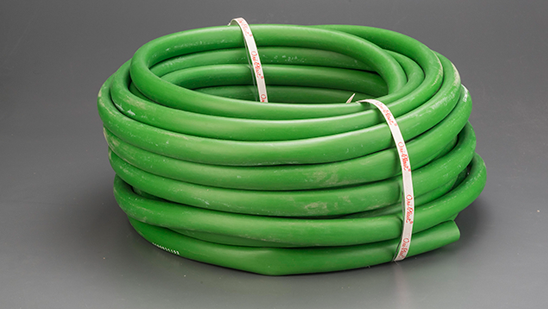When it comes to garden hoses, both PVC and rubber options are popular, but they each offer distinct features and advantages. Choosing between a PVC (Polyvinyl Chloride) garden hose and a rubber hose depends on your gardening needs, preferences, and budget. In this comparison, we’ll dive into the differences and benefits of each type to help you decide which one is the right fit for your outdoor tasks.
1. Durability: Which Hose Lasts Longer?
Durability is a major factor to consider when choosing a garden hose, especially if you want a long-lasting, low-maintenance solution.
PVC Garden Hose: PVC hoses are made from durable, lightweight material that can resist regular wear and tear. While they’re resilient, they may not withstand extreme environments as well as rubber hoses. Their outer layer is abrasion-resistant, but they may crack or become brittle when exposed to intense sun or cold over time.
Rubber Garden Hoses: Rubber hoses are known for their durability, especially in extreme temperatures. They can handle both hot and cold weather without becoming brittle or losing flexibility. Rubber hoses are also abrasion-resistant and highly resistant to kinks, making them a reliable choice for rough or demanding outdoor work.
Verdict: If you need a hose for extreme conditions or heavy-duty use, a rubber hose may be more durable. For general gardening and moderate weather, PVC hoses are durable enough and lighter to handle.
2. Weight: Lightweight PVC vs. Heavier Rubber
The weight of a garden hose impacts its ease of use, especially if you’re working with a large garden or need to move the hose frequently.
PVC Garden Hoses: PVC hoses are significantly lighter than rubber hoses, making them easier to handle, carry, and maneuver around your garden. Their lightweight nature is ideal for elderly gardeners, children, or anyone who prefers a hose that won’t cause strain.
Rubber Garden Hoses: Rubber hoses are heavier due to the density of the material. While this adds durability, it also makes them more cumbersome to move around. Their weight can be a drawback if you have a large space to cover or if you plan to use the hose frequently.
Verdict: If you prioritize a lightweight and easy-to-maneuver hose, go with PVC. For those who don’t mind the weight and need a rugged option, rubber is a solid choice.
3. Flexibility and Kink Resistance
One of the most common frustrations with garden hoses is kinking, which can interrupt water flow and make tasks difficult.
PVC Garden Hoses: PVC hoses are generally more flexible in moderate temperatures but can become stiff in very cold conditions. Many PVC hoses are designed to resist kinks, but they may be more prone to twisting in extremely low temperatures.
Rubber Garden Hoses: Rubber hoses are highly flexible and less likely to kink or twist, even in cold weather. Their flexibility remains consistent across a range of temperatures, making them easier to use and less prone to interruptions in water flow.
Verdict: For year-round flexibility and kink resistance, rubber hoses outperform PVC hoses. However, if you’re in a mild climate, a kink-resistant PVC hose may meet your needs.
4. Cost-Effectiveness: Budget-Friendly vs. Premium Investment
For many gardeners, the budget is a big consideration when choosing between PVC and rubber hoses.
PVC Garden Hoses: PVC hoses are typically more affordable than rubber hoses, making them a budget-friendly choice. They provide reliable performance without the high price tag, which is ideal for casual gardeners or those who only need a hose for light-duty tasks.
Rubber Garden Hoses: Rubber hoses are often more expensive due to their durability and high-quality material. While they require a larger upfront investment, their longevity and reliability can offset the cost over time.
Verdict: If you’re looking for an economical choice, PVC is the better option. For those who want to invest in a longer-lasting hose and don’t mind spending more, rubber hoses are worth the premium.
5. Versatility: Multi-Purpose Use
The versatility of a garden hose can be an advantage, especially if you need it for tasks beyond watering plants.
PVC Garden Hoses: PVC hoses are versatile and can handle light to medium-duty tasks like watering plants, washing cars, and cleaning patios. However, they may not be suited for industrial or heavy-duty work.
Rubber Garden Hoses: Rubber hoses are more versatile and can be used for heavy-duty tasks beyond gardening, such as construction site use, high-pressure washing, or other demanding applications. Their durability makes them suitable for a broader range of tasks.
Verdict: For general-purpose use, PVC hoses are sufficient. If you need a hose for a variety of heavy-duty tasks, rubber is more versatile.
6. Environmental Impact and Safety
For eco-conscious gardeners, the materials and potential impact of a garden hose on the environment and plants are important factors.
PVC Garden Hoses: Traditional PVC hoses may contain chemicals such as phthalates and BPA, which can be harmful to plants and soil. However, there are eco-friendly PVC options available that are free from these chemicals, making them safe for organic gardening.
Rubber Garden Hoses: Rubber hoses, especially those made with natural rubber, are generally safer for the environment. They are often free from harmful chemicals and can handle high temperatures without releasing toxins, making them a better option for watering edible plants.
Verdict: If you prioritize environmental safety, look for eco-friendly PVC or opt for rubber hoses that are free from harmful chemicals.
7. Storage and Maintenance
Proper storage and maintenance can impact the lifespan of your garden hose.
PVC Garden Hoses: PVC hoses are easier to coil and store due to their lightweight design. They require minimal maintenance, though it’s best to store them indoors during the winter to prevent cracking.
Rubber Garden Hoses: Rubber hoses are more challenging to coil due to their weight but are highly resistant to weathering. They don’t need special storage arrangements for winter, making them relatively low-maintenance.
Verdict: For easy storage and minimal maintenance, PVC hoses are preferable. Rubber hoses offer hassle-free storage and resilience for those who want a more rugged option.
8. Aesthetics and Color Choices
Appearance isn’t the most critical factor, but it can impact how a hose blends with your garden.
PVC Garden Hoses: PVC hoses come in a variety of colors, including bright green, blue, and clear. This makes it easier to find a hose that matches your garden’s aesthetic or stands out for visibility.
Rubber Garden Hoses: Rubber hoses are usually black or dark in color, which can blend well with natural settings but may be less visually appealing for those who prefer a colorful look.
Verdict: For those who care about aesthetics, PVC hoses offer more color options.
Final Verdict: PVC vs. Rubber Garden Hose – Which One is Right for You?
Choosing between a PVC and rubber garden hose depends on your priorities and gardening needs:
- PVC Garden Hose: Ideal for casual gardeners who want an affordable, lightweight, and versatile hose for basic tasks in mild conditions. It’s a budget-friendly choice that offers convenience without compromising functionality.
- Rubber Garden Hose: Best for heavy-duty use and gardeners who need a highly durable, kink-resistant, and all-weather hose. It’s an investment that pays off with a longer lifespan and excellent performance under tough conditions.
Ultimately, both PVC and rubber garden hoses have their unique benefits. Consider your specific needs, budget, and the environment you’ll be working in to make the best choice for your gardening setup.




